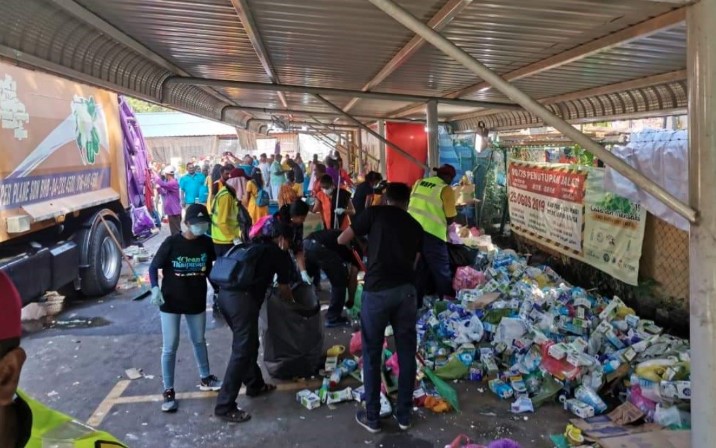PETALING JAYA: The waste management system at Batu Caves is under strain and unable to cope with the high volume of visitors, a situation that experts warned is jeopardising the site’s cleanliness and long-term environmental sustainability.
Experts said with tourist numbers projected to climb in the coming years, there is an urgent need for infrastructure upgrades and public awareness campaigns to safeguard the cultural and ecological integrity of the iconic attraction.
The concerns follow recent findings from UK-based waste management firm Business Waste, which in a May report identified
Batu Caves as the world’s most littered tourist attraction.
The study found that 1.67% of 13,950 online reviews mentioned rubbish, the highest proportion among global tourist sites.
Egypt’s Pyramids of Giza ranked second, with 0.39% of 9,058 reviews referencing waste, while Australia’s Bondi Beach placed third, with 0.28% of 6,858 reviews citing cleanliness.
Experts said without swift intervention, Batu Caves risks not only environmental degradation but also reputational damage that could deter visitors.
Universiti Teknologi Mara tourism economics lecturer Prof Dr Mohd Hafiz Hanafiah said although Batu Caves is one of Malaysia’s most iconic tourist destinations, the growing problem of overflowing bins and scattered litter, often worsened by the local monkey population, signals that the waste facilities are no longer sufficient.
“Tourism contributes to waste and litter issues at major attractions, such as Batu Caves, where large crowds put immense pressure on cleaning and waste management systems,”
he said.
“During peak periods, it becomes difficult for cleaners to keep up, leading to overflowing bins and overwhelmed infrastructure. We need better crowd control, reduced plastic usage and strategies to distribute tourists more evenly across alternative sites,” he added.
Mohd Hafiz emphasised that Malaysia’s tourism policies often prioritise growth in visitor numbers, sometimes at the expense of environmental sustainability.
“While there has been progress towards responsible tourism, we need stronger, site-level action, such as eco-certification, tourist caps and sustainable transport solutions.”
He highlighted the increasing influence of online reviews on tourist decisions, warning that negative perceptions on cleanliness could damage the appeal of a destination.
“Modern tourists rely heavily on online feedback before making travel choices. If a place is perceived as dirty, many would simply skip it.
“The recent study showed Batu Caves had the highest rate of litter mentions in reviews globally. News such as this could seriously harm its reputation over time.”
He warned that continued neglect of litter management at popular sites could have consequences for Malaysia’s international image.
“If we do not address the litter issue, Malaysia risks being considered an ‘unhygienic’ or ‘dirty’ destination, a perception that could deter tourists, especially those from countries that value cleanliness and environmental responsibility.
“This could affect tourism-related jobs, local businesses and Malaysia’s overall reputation as a clean and welcoming country,” he cautioned.
He said while campaigns such as “Sayangi Malaysiaku” have made an impact, they remain too domestically focused and need greater visibility in tourist hotspots through friendly signage, influencer support and school-based education.
Universiti Putra Malaysia Faculty of Forestry and Environment senior lecturer Dr Mohd Yusoff warned that unmanaged litter at Batu Caves poses serious environmental threats, especially to local wildlife.
“Long-tailed macaques’ exposure to human generated waste may lead to disruptive behaviour and health problems,” he said.
“Litter not only degrades their natural habitat but could also disrupt the fragile cave ecosystem and wash into nearby rivers, endangering aquatic life.”
He added that the site’s unique limestone terrain and interconnected river system amplify the ecological impact of pollution.
“Visually, litter spoils the natural beauty of the area, diminishing the visitor experience. More importantly, as a sacred religious site, its desecration undermines its spiritual and cultural significance.”
Mohd Yusoff said the monkeys at Batu Caves often rummage through overflowing bins and leftover food, spreading litter around the area, adding that tourists make the problem worse by feeding them, which encourages the monkeys to grab food and packaging that they later throw away.
“Their dependence on food from litter or tourists disrupts their natural behaviour. This makes the litter problem worse, especially with poor waste control and large crowds,” he said.
He suggested adopting smart solutions, such as Internet of Things-enabled bins with real-time sensors to alert authorities when nearing capacity, ensuring timely collection and reducing overflow.
“Linking messages to religious values along with clear waste-sorting guides could improve impact. Involving students or NGOs in waste audits and showing visible results through data-driven campaigns could also increase public engagement.”









